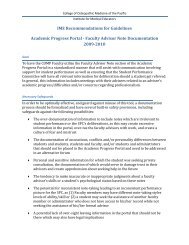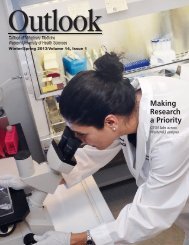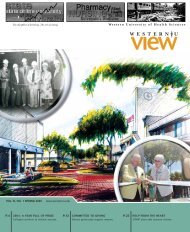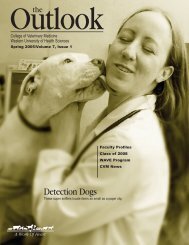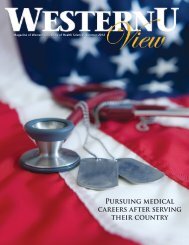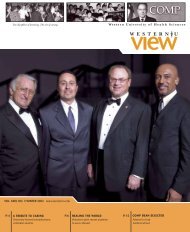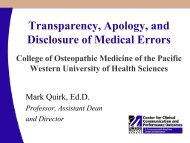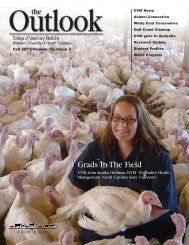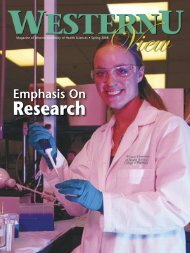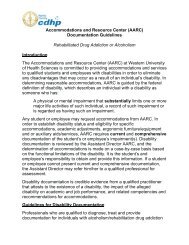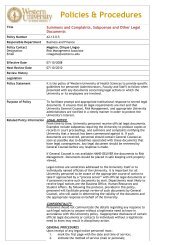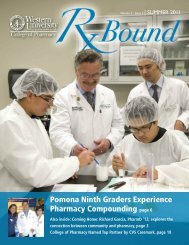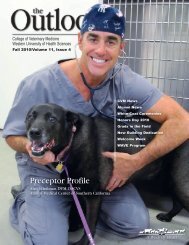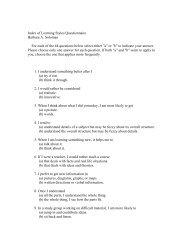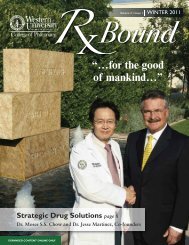Outlook Preceptor Profile: - Western University of Health Sciences
Outlook Preceptor Profile: - Western University of Health Sciences
Outlook Preceptor Profile: - Western University of Health Sciences
You also want an ePaper? Increase the reach of your titles
YUMPU automatically turns print PDFs into web optimized ePapers that Google loves.
Rare Arabian Herd Rescued, Rehabilitated,Ready to Work as Equine TherapistsWESTERN UNIVERSITY OF HEALTH SCIENCES DVM students beginclinical skills training in the first year <strong>of</strong> their program, practicingphysical exams and wellness care in the College’s two wellnessclinics. Second-year students gain more experience in theVeterinary Ambulatory Community Service vehicle, a clinic-onwheelsthatprovidesfree/low-costservices topeople whocan’t affordveterinarycare. Largeanimalclinicalexperience takes place at California State Polytechnic <strong>University</strong>,Pomona, at community preceptor practice sites, and during themany occasions when students volunteer with CVM faculty tohelp nonpr<strong>of</strong>it organizations like The Pegasus Rising Project(www.pegasusrising.org) and its rescued herd <strong>of</strong> at-risk Arabianhorses.In January, eleven CVM students (some from the Student Chapter<strong>of</strong> the American Association for Equine Practitioners), and facultyvolunteers Dr. Paul Gordon-Ross and Dr. Elizabeth Schilling,joined volunteer equine veterinarians Dr. Steven Colburn andDr. Jeffrey Moss <strong>of</strong> Creekside Veterinary Service(www.creeksidevets.net) in Escondido, CA to help with physicalexams, surgical castrations, and ho<strong>of</strong> trimmings for a rescuedArabian herd <strong>of</strong> nine stallions,17 mares and three foals.For Tiffany Stillian, DVM ’11,the experience was nothingless than amazing. “For thefirst horse, Drs. Colburn andMoss demonstrated a fullequine castration, fromanesthesia induction, to theactual castration, to recovery.After this demonstration, wedivided into groups, where weeach got a chance atadministering injectable sedation and anesthesia, injectableantibiotics, preparing the surgical site, and actually performing halfor full castrations under doctor supervision and direction.”The family <strong>of</strong> horses rescued by Pegasus Rising is no ordinaryherd. The two original horses were brought from Poland with thehelp <strong>of</strong> Ronald Reagan during his Presidency. The first <strong>of</strong> thesetwo stallions—champion racer Gedymin—won races in Polandequivalent to the U.S.Triple Crown,while Dalimin was a descendent<strong>of</strong> the great stallion Lotnik,imported by World War IIGeneral George S. Patton.The 29 <strong>of</strong>fspring <strong>of</strong> thesetwo rare, historicallysignificant Arabianchampions had developedand lived together over 30years on a ranch thatdegenerated as the ownersaged. They weremalnourished, teeming withparasites, up to their ankles inmud and their own waste.“This is about rescuing a very significantgroup <strong>of</strong> horses that are innately different than a lot <strong>of</strong> horses weencounter.They’re extremely docile and loving toward humans,”explained Cynthia Royal, founder <strong>of</strong> the Pegasus Rising Project.Julie Huber, DVM ’12, hasn’t decided if she will pursue equinemedicine, but she does plan to own a horse, and welcomed theopportunity to gain hands-on experience. “My favorite part <strong>of</strong> theday was taking part in an exam on a horse that had a history <strong>of</strong>chronic obstructive pulmonary disease,” she said. “Dr. Colburnwalked us through the signs that the horse was displaying, allowedus to auscult the thoracic cavity, and educated us on the adverseeffects <strong>of</strong> performing anesthesia on a patient in this condition.”Dr. Elizabeth Schilling noted,“The students got to see some <strong>of</strong> thecommon complications associated with these ‘routine’ procedures,such as colic, had an opportunity to discuss the complications, andthink about strategies to prevent them rather than deal withthem.”When they regain their health, these gentle horses will have a newmission: to teach people with trust issues, past abuse or any type<strong>of</strong> emotional trauma how to safely relate and connect withanother living creature again. The “Healing with Horses Therapyand Enrichment Programs” will provide equine-assistedpsychotherapy to further the emotional healing <strong>of</strong> veterans withpost-traumatic stress disorder, abused children, autistic children,and survivors <strong>of</strong> domestic violence.“The goal is to raise human healing, potential and consciousness toa new level through the way <strong>of</strong> the horse,” explains Cynthia Royal.“The Pegasus Rising Project will <strong>of</strong>fer opportunities for all torealize a clearer understanding <strong>of</strong> the role that horses and humansplay in healing each other, the community and the planet.”4



